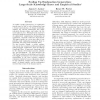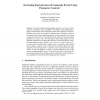311 search results - page 42 / 63 » Evaluating Complex Semantic Artifacts |
109
click to vote
ICDT
2007
ACM
15 years 8 months ago
2007
ACM
Abstract. In many cases, users may want to consider incomplete answers to their queries. Often, however, there is an overwhelming number of such answers, even if subsumed answers a...
113
click to vote
CSB
2005
IEEE
2005
IEEE
BioNavigation: Using Ontologies to Express Meaningful Navigational Queries Over Biological Resources
15 years 7 months ago
Exploiting the complex maze of publicly available Biological resources to implement scientific data collection pipelines poses a multitude of challenges to biologists in accurate...
118
click to vote
AAAI
1996
15 years 3 months ago
1996
To explain complex phenomena, an explanation system must be able to select information from a formal representation of domain knowledge, organize the selected information into mul...
110
click to vote
CISIS
2010
IEEE
15 years 8 months ago
2010
IEEE
— The engineering of complex production automation systems involves experts from several backgrounds, such as mechanical, electrical, and software engineering. The production aut...
107
click to vote
ADBIS
2008
Springer
15 years 8 months ago
2008
Springer
The event-condition-action paradigm (also known as triggers or ECA rules) gives a database “active” capabilities – the ability to react automatically to changes in the databa...


